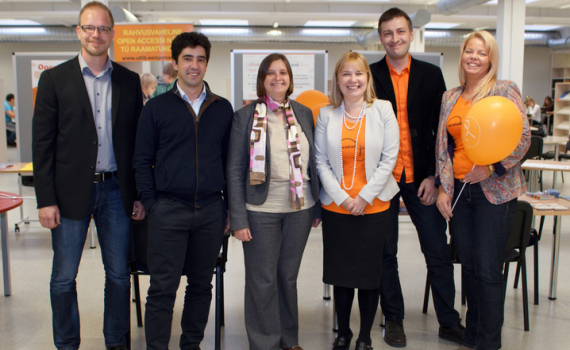
The University of Tartu Library (UTL) has released the results of an EIFL-funded project on implementing open research data support services, enhancing open access (OA) support services and OA policy discussions in Tartu University.
The eight-month project has been designed to meet the following objectives:
- Discuss institutional and national OA policies;
- Raise awareness on open research data and opportunities it offers for creating an effective semantic web by linking publications and research data that are openly available;
- Raise awareness on publishing OA journals (via UTL OJS platform) and OA monographs (capitalizing on a strong partnerships with the UT press and OAPEN);
- Make research output available in the UTL repository.
Key achievements and impact
- Policy change: The Estonian Research Council requires making the articles, produced from publicly funded research, available for everyone. This indicates that there has been a clear change in the principles for giving out research grants. In addition, OA principles has been added as underlying standpoint to the RD&I strategy erawatch.jrc.ec.europa.eu/erawatch/opencms/information/country_pages/ee/policydocument/policydoc_0009 Knowledge Based Estonia 2014-2020". Among the project activities there were a number of discussions between the researchers, university representatives, publishers, funders and policy makers, dedicated not to the question whether or not Estonia should have an OA policy, but to the question what the policy should be like.
- An infrastructure set for researchers to share their open research data. As a result of the Open Data Month (January 2014 – an event engaging researchers in sharing their research data) researchers, funders and policy makers have become more interested in reproducible research. UT received funding from the Estonian government and joined DataCite as a member to improve the quality of research by enabling people to find, share, use, and cite research data. And UTL has started developing a new web based work-flow through which researchers can publish their data sets and make them openly available.
- UTL has built support systems to assist researchers with depositing their publications in OA repository. (28% increase in self-archiving after the trainings UTL provided). UT alumni have been reached out and over a hundred of them provided OA to their theses and dissertations. OA and open data have been widely discussed by researchers and students and received a lot of media attention. There were over 1500 visits to UT's OA portal during OA Week 2013 and a new open research data page was visited 700 times during OA Week 2013.
- UTL consolidated publishing of OA journals and OA monographs: UTL has integrated five OA journals from other platforms and published two OA journals on OJS platform (a total number of OA journals now is 12). The UT Press has published 16 OA monographs, all of them are available at OAPEN platform and in DOAB.
- A network of advocates. The project offered a platform for experts from different fields (researchers, universities, publishers, funders and policy makers) to exchange expertise, discuss implementation and practice OA.
Read the case study written by the project manager Elena Sirpia-Mironov [PDF].
This is the first case study highlighting the results of EIFL-funded national and institutional OA advocacy campaigns to reach out to research communities in Africa, Asia, and Europe in 2013-2014. These case studies illustrate activities, advocacy strategies, successes and lessons learnt, thus libraries everywhere can benefit. Stay tuned for other cases and news.
The EIFL-OA Programme is supported by the Information Programme, Open Society Foundations.
SHARE / PRINT









